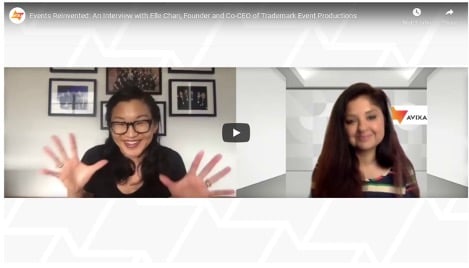New Solutions: New Events
 Events Reinvented
Events Reinvented
“The new normal” is buzzy at best, but we also know that live events will not look the same for the foreseeable future. We are all striving to do our digital best to navigate the here and now, but with so many known unknowns, how can we adapt to survive?
In our new series of video interviews, Events Reinvented, AVIXA speaks with top live event planners and producers to get the latest on how COVID-19 is impacting their work.
- Elle Chan, Founder and Co-CEO, Trademark Event Productions
- Gianna Gaudini, Global Head of Events for the SoftBank Investment Advisors (Vision Fund)
- Victoria Neeson, CEO, Dreamtek
- Dave Rosenberg, Senior Production Manager, WeWork
In 20 minutes or less you’ll learn the approach these professionals have taken and get their advice on what event producers can and should be doing to move their events forward.
We’ve taken snippets of advice from the interviews to read below:
Collaborative thinking and adaptability
“We need to come together and collaborate and innovate because virtual events are where we need to be.”
Victoria Neeson: “We have to continue to innovate and adapt and we have to come together. We need to remove that kind of competitiveness that we've seen in the past and come together for collaboration and innovation because virtual events are where we need to be and that's what our customers and communities are going to be relying and depending on. Continue to innovate AND stick together.”
“People standing by each other is actually one of the most important things.”
Elle Chan: “I have been getting a tremendous amount of support from my colleagues in AV. We're all still here for each other and supporting each other's businesses, looking, watching, learning, and talking about new technologies together. For people to stand by each other is actually one of the most important things. In the end, you look at how many people in the AV industry that you worked with for decades, even if it's in a different capacity and today we are still continuing to collaborate with those people side by side. We know where their expertise is with each other, and how we can have each other's backs. I think is something that is enduring in life and enduring in in our careers. And that's kind of what makes it worth going to work every day.”
“We're going to have to find new solutions and use new tools.”
Dave Rosenberg: “Things are going to get back to normal. And if nothing else for us professionals, they're going to become a lot more interesting than they have been in the past. We're going to have to find new solutions and use new tools. I think that's the most fun part about the job. So, I'm ready to get back to it and just start learning new processes, coming up with new ideas, and sharing those thoughts with the community.”
Related: Is the ‘Experience Economy’ Still Relevant?
“Smart vendors don't let the constraints of the situation limit them, they instead ask, what can we provide in this environment?”
Gianna Gaudini: “Smart vendors have pivoted, and they've shifted their focus to supporting virtual events. They are hosting brainstorming sessions on how to create the best virtual experience. Thinking about creating kits to send to speakers for better in-home sound and even a better lighting experience. Smart vendors aren’t letting the constraints of the situation limit them, but instead taking the approach of OK, what can we provide in this environment?”
The big virtual event lockdown showdown
“It's more imperative now than ever to understand your client base.”
Dave Rosenberg: “You absolutely have to understand the audience that you're catering the event to. For example, internally we have one-hour meetings and events. That works pretty well for an in-room audience, but it doesn't work so well for the at home audience who have spouses, children and pets. There are just thousands of distractions that you have to compete with. So, in some cases, that means shortening down your content to being more condensed, concise and more digestible. That person who would normally be in the room now has the attention span for 10-15 minutes. On the other hand, there are audiences that will tune in live to watch Questlove spin for hours on end. It really depends on the type of event that you're hosting, but it's more imperative now than ever understand your client base.”
“We want to be able to understand what the event is and choose the right platform. One size does not fit all.”
Victoria Neeson: “There is a huge proliferation of tools and platforms out there. We've been doing a bit of research and breaking them down into categories. Immersive event platforms versus just conferencing platforms or what gives you a really good virtual event experience versus what's easy to use. We are trying to be quite agnostic because we feel that the event is going to dictate and drive the type of platform that is used. So, we're kind of reversing it and we want to be able to understand what the event is and then figure out what the right platform is to use for that particular event.”
“What really holds people's attention is well produced, content, good speakers and good sounding audio.”
Gianna Gaudini: “What holds people's attention most isn't the flashy virtual trade show platform. These virtual experiences only hold people's attention for a few minutes. What really holds people's attention, is well produced, content, good speakers and sounding good audio.”
“If you're not going to take a risk, you're just going to do the same thing.”
Elle Chan: “The virtual event industry is really in its very nascent stages. The first thing that everybody did was simply to move the live event over, out of necessity. That's a big testament to all of the people and the crews that were working on those shows. Being able to shoot all the footage and record all the sessions, plus work with platforms that were already existing to be able to deliver a virtual conference or virtual event. At the same time, I think that that was just step one of twenty. I would imagine that when you look at the numbers, the most telling thing is how much viewership there is and how long people are staying and watching content. It’s not a sure thing that you're just going to pivot to virtual and everybody's going to watch. Your message has to be more compelling. We're losing that energy of the in-person live event, the audience and what it really feels like to be together and experiencing something collectively.
Where the industry needs to go is to be thinking more about new experiences. It is really about how we can have meaningful experiences together and do these kinds of projects and learning together. It's a change to the entire construct of it, being willing to ask your clients to take a risk, because if you're not going to take a risk, you're just going to do the same thing.”
Read Next: How to Take Your Live Events Business to the Next Level
Three seasoned live event professionals came together for a conversation with AV expert Tom Stimson to share how they are adapting their businesses to the current environment, what’s next for their organizations, and how they see the live events industry playing out in the long run.






